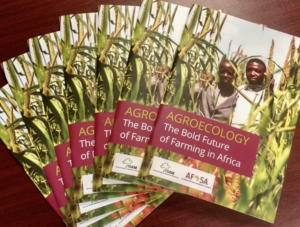16 February 2017. The Alliance for Food Sovereignty in Africa (AFSA) launched a publication highlighting the huge potential of agroecology to feed Africa, fix broken food systems and repair damaged landscapes, providing abundant healthy and nutritious food sustainably while increasing incomes and improving climate resilience.
The 88 page illustrated book showcases 15 case studies, showing how agroecology benefits Africa in terms of food and nutrition, livelihoods, restoration of biodiversity, knowledge and innovation, and climate change resilience.
The publication also answers the question: What is Agroecology? and demonstrates clearly how agroecology contributes to the achievement of the Sustainable Development Goals (SDGs). It draws lessons and conclusions from the case studies and sets out a way forward to make the bold transition to sustainable, effective and equitable food systems.
The book highlights experiences ranging from the orange-fleshed sweet potato that brings health and livelihood in Ghana, to reviving the climate resilient Ankole longhorn cattle in Uganda, and reclaiming life in fragile ecosystems through innovative solutions in Burkina Faso. With the concept of food sovereignty at its core, the book demonstrates that agroecology creates just food systems, cuts greenhouse gases and environmental degradation and provides a sustainable future for us all.
AFSA’s Agroecology Working Group and Tanzania Organic Agriculture Movement worked together to produce the book.
Related:
7 February 2017. Study shows tree fruit could help reduce poverty African rural areas
The 88 page illustrated book showcases 15 case studies, showing how agroecology benefits Africa in terms of food and nutrition, livelihoods, restoration of biodiversity, knowledge and innovation, and climate change resilience.
Leading experts in their fields explain how agroecology reforms food systems to promote better nutrition and health, especially among poor communities; how it diversifies livelihoods and defends the dignity of women farmers; how it enables and empowers us to revive our soils and lands, cultivate relevant crops, advance food sovereignty, and build resilient ecosystems and communities; and how such innovative production systems, based on indigenous knowledge, meet the nutritional, cultural and spiritual needs of Africa’s people.“If anyone still entertained doubts as to the benefits of agroecology and as to whether it can meet the challenges of this century, this collection of essays provides a compelling answer.” Olivier De Schutter, Co-Chair of IPES-Food and Former UN Special Rapporteur on the Right to Food
The publication also answers the question: What is Agroecology? and demonstrates clearly how agroecology contributes to the achievement of the Sustainable Development Goals (SDGs). It draws lessons and conclusions from the case studies and sets out a way forward to make the bold transition to sustainable, effective and equitable food systems.
Agroecology is taking off worldwide. The Food and Agriculture Organization (FAO) of the United Nations has recently opened an online portal dedicated to agroecology, along with an online discussion forum on Sustainable Farming through agroecology.“There is an avalanche of evidence coming from almost everywhere in the world that agroecology works,” agrees Dr. Million Belay, Coordinator of the Alliance for Food Sovereignty in Africa (AFSA).“There could not have been a more opportune time to publish Agroecology: The Bold Future of Farming in Africa.” Hans R Herren, World Food Prize (1995) and Right Livelihood (2013) Laureate
The book highlights experiences ranging from the orange-fleshed sweet potato that brings health and livelihood in Ghana, to reviving the climate resilient Ankole longhorn cattle in Uganda, and reclaiming life in fragile ecosystems through innovative solutions in Burkina Faso. With the concept of food sovereignty at its core, the book demonstrates that agroecology creates just food systems, cuts greenhouse gases and environmental degradation and provides a sustainable future for us all.
AFSA’s Agroecology Working Group and Tanzania Organic Agriculture Movement worked together to produce the book.
The book calls for no less than a complete transformation of our agricultural and food systems. The book, Agroecology: the bold future of farming in Africa, is available as a free download“What is special about this project is that it brings together the experiences and voices of small-scale producers who actually feed Africa, for all the world to see, hear, and learn from,” Mrs. Mariann Bassey Orovwuje, Chairperson of AFSA.
Related:
7 February 2017. Study shows tree fruit could help reduce poverty African rural areas
Trees may be easy to spot on the plains of Africa, but they often are overlooked as a source of income for farmers. A University of Illinois study shows trees on farms may help reduce rural poverty and maintain biodiversity.
 |
| Daniel Miller, University of Illinois researcher in the College of Agricultural, Consumer and Environmental Science |
“Trees on farms in Africa often fall through the cracks — they’re not forests and they’re not agriculture,”“In our study, we found about one third of all rural farmers across five study countries have and grow trees on their farms. Among those farmers, trees on farms contribute 17 percent to their annual household income, so they’re very important for generating economic benefits for households.” Daniel Miller, University of Illinois, who studies environmental politics and policy.Miller’s study used satellite images showing forest cover and nationally representative household-level data gathered from in-person interviews in Ethiopia, Malawi, Nigeria, Tanzania and Uganda.


No comments:
Post a Comment